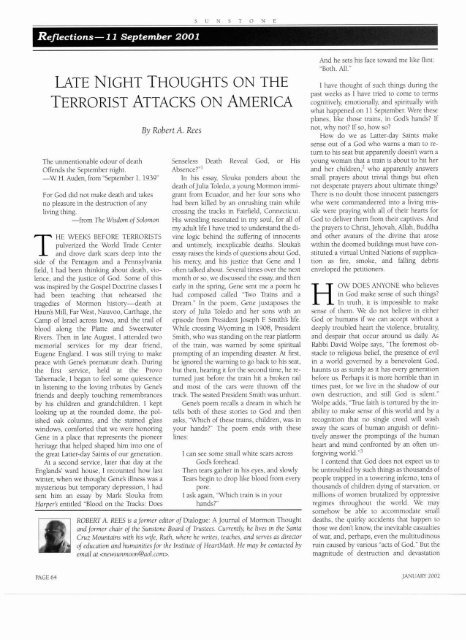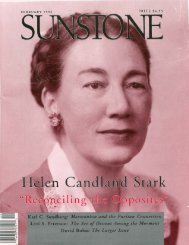Eugene England - Sunstone Magazine
Eugene England - Sunstone Magazine
Eugene England - Sunstone Magazine
You also want an ePaper? Increase the reach of your titles
YUMPU automatically turns print PDFs into web optimized ePapers that Google loves.
LATE NIGHT THOUGHTS ON THE<br />
The unmentionable odour of death<br />
Offends the September night.<br />
-W H. Auden, from "September 1, 1939<br />
For God did not make death and takes<br />
no pleasure in the destruction of any<br />
living thing.<br />
-from The Wisdom of Solomon<br />
T<br />
HE WEEKS BEFORE TERRORISTS<br />
pulverized the World Trade Center<br />
and drove dark scars deep into the<br />
side of the Pentagon and a Pennsylvania<br />
field, I had been thinking about death, violence,<br />
and the justice of God. Some of this<br />
was inspired by the Gospel Doctrine classes I<br />
had been teaching that rehearsed the<br />
tragedies of Mormon history-death at<br />
Haun's Mill, Far West, Nauvoo, Carthage, the<br />
Camp of Israel across Iowa, and the trail of<br />
blood along the Platte and Sweetwater<br />
Rvers. Then in late August, I attended two<br />
memorial services for my dear friend,<br />
<strong>Eugene</strong> <strong>England</strong>. I was still trylng to make<br />
peace with Gene's premature death. During<br />
the first service, held at the Provo<br />
Tabernacle, I began to feel some quiescence<br />
in listening to the loving tributes by Gene's<br />
friends and deeply touching remembrances<br />
by his children and grandchildren. I kept<br />
looking up at the rounded dome, the polished<br />
oak columns, and the stained glass<br />
windows, comforted that we were honoring<br />
Gene in a place that represents the pioneer<br />
heritage that helped shaped him into one of<br />
the great Latter-day Saints of our generation.<br />
At a second service, later that day at the<br />
<strong>England</strong>s' ward house, I recounted how last<br />
winter, when we thought Gene's illness was a<br />
mysterious but temporary depression, I had<br />
sent him an essay by Mark Slouka from<br />
Hamer's entitled "Blood on the Tracks: Does<br />
By Robert A. Rees<br />
Senseless Death Reveal God, or His<br />
~bsence?"'<br />
In his essay, Slouka ponders about the<br />
death of Julia Toledo, a young Mormon immigrant<br />
from Ecuador, and her four sons who<br />
had been killed by an onrushing train while<br />
crossing the tracks in Fairfield, Connecticut.<br />
His wrestling resonated in my soul, for all of<br />
my adult life I have tried to understand the divine<br />
logic behind the suffering of innocents<br />
and untimely, inexplicable deaths. Slouka's<br />
essay raises the kinds of questions about God,<br />
his mercy, and his justice that Gene and I<br />
often talked about. Several times over the next<br />
month or so, we discussed the essay, and then<br />
early in the spring, Gene sent me a poem he<br />
had composed called "Two Trains and a<br />
Dream." In the poem, Gene juxtaposes the<br />
story of Julia Toledo and her sons with an<br />
episode from President Joseph F: SmithS life.<br />
While crossing Wyoming in 1908, President<br />
Smith, who was standing on the rear platform<br />
of the train, was warned by some spiritual<br />
prompting of an impending disaster. At first,<br />
he ignored the warning to go back to his seat,<br />
but then, hearing it for the second time, he returned<br />
just before the train hit a broken rail<br />
and most of the cars were thrown off the<br />
track. The seated President Smith was unhurt.<br />
Gene's poem recalls a dream in which he<br />
tells both of these stories to God and then<br />
asks, "Which of these trains, children, was in<br />
your hands?" The poem ends with these<br />
lines:<br />
I can see some small white scars across<br />
God's forehead.<br />
Then tears gather in his eyes, and slowly<br />
Tears begn to drop like blood from every<br />
pore.<br />
I ask again, "Which train is in your<br />
hands?"<br />
ROBERT A. REES is afomer editor of Dialogue: A Journal of Mormon Thought<br />
andformer chair of the <strong>Sunstone</strong> Board of Trustees. Currently, he lives in the Santa<br />
Cruz Mountains with his wife, Ruth, where he writes, teaches, and serves as director<br />
of education and humanitiesfor the Institute of HeartMath. He may be contacted by<br />
email at .<br />
And he sets his face toward me like flint:<br />
"Both. All."<br />
I have thought of such things during the<br />
past weeks as I have tried to come to terms<br />
cognitively, emotionally, and spiritually with<br />
what happened on 11 September. Were these<br />
planes, like those trains, in God's hands? If<br />
not, why not? If so, how so?<br />
How do we as Latter-day Saints make<br />
sense out of a God who warns a man to return<br />
to his seat but apparently doesn't warn a<br />
young woman that a train is about to hit her<br />
and her children: who apparently answers<br />
small prayers about trivial things but often<br />
not desperate prayers about ultimate things?<br />
There is no doubt those innocent passengers<br />
who were commandeered into a living missile<br />
were praying with all of their hearts for<br />
God to deliver them from their captives. And<br />
the prayers to Christ, Jehovah, Allah, Buddha<br />
and other avatars of the divine that arose<br />
within the doomed buildings must have constituted<br />
a virtual United Nations of supplication<br />
as fire, smoke, and falling debris<br />
enveloped the petitioners.<br />
H<br />
OW DOES ANYONE who believes<br />
in God make sense of such things?<br />
In truth, it is impossible to make<br />
sense of them. We do not believe in either<br />
God or humans if we can accept without a<br />
deeply troubled heart the violence, brutality<br />
and despair that occur around us daily As<br />
Rabbi David Wolpe says, "The foremost obstacle<br />
to religous belief, the presence of evil<br />
in a world governed by a benevolent God,<br />
haunts us as surely as it has every generation<br />
before us. Perhaps it is more horrible than in<br />
times past, for we live in the shadow of our<br />
own destruction, and still God is silent."<br />
Wolpe adds, "True faith is tortured by the inability<br />
to make sense of this world and by a<br />
recognition that no single creed will wash<br />
away the scars of human anguish or definitively<br />
answer the promptings of the human<br />
heart and mind confronted by an often unforgiving<br />
~orld."~<br />
I contend that God does not expect us to<br />
be untroubled by such things as thousands of<br />
people trapped in a towering inferno, tens of<br />
thousands of children dylng of starvation, or<br />
millions of women brutalized by oppressive<br />
regmes throughout the world. We may<br />
somehow be able to accommodate small<br />
deaths, the quirky accidents that happen to<br />
those we don't know, the inevitable casualties<br />
of war, and, perhaps, even the multitudinous<br />
ruin caused by various "acts of God." But the<br />
magnitude of destruction and devastation<br />
PAGE 64<br />
JANUARY ZOO2

















